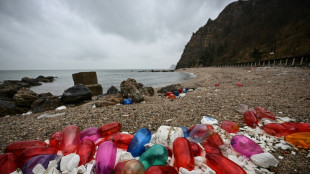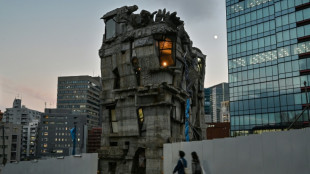
-
 Countrywide air alert in Ukraine due to missile threat
Countrywide air alert in Ukraine due to missile threat
-
China's military corruption crackdown explained

-
 Primark boss defends practices as budget fashion brand eyes expansion
Primark boss defends practices as budget fashion brand eyes expansion
-
Williamson eyes ton as New Zealand take control against England

-
 Norway faces WWF in court over deep sea mining
Norway faces WWF in court over deep sea mining
-
Trump, Sheinbaum discuss migration in Mexico amid tariff threat

-
 Asian markets mixed after subdued pre-holiday shift on Wall St
Asian markets mixed after subdued pre-holiday shift on Wall St
-
Orban's soft power shines as Hungary hosts Israeli match

-
 'Retaliate': Trump tariff talk spurs global jitters, preparations
'Retaliate': Trump tariff talk spurs global jitters, preparations
-
'Anti-woke' Americans hail death of DEI as another domino topples

-
 Trump hails migration talks with Mexico president
Trump hails migration talks with Mexico president
-
Truckers strike accusing Wagner of driver death in Central African Republic

-
 London police say 90 victims identified in new Al-Fayed probe
London police say 90 victims identified in new Al-Fayed probe
-
Air pollution from fires linked to 1.5 million deaths a year
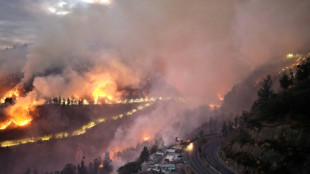
-
 Latham falls for 47 as New Zealand 104-2 in first England Test
Latham falls for 47 as New Zealand 104-2 in first England Test
-
US tells Ukraine to lower conscription age to 18

-
 Judge denies Sean Combs bail: court order
Judge denies Sean Combs bail: court order
-
Suarez extends Inter Miami stay with new deal

-
 Perfect Liverpool on top of Champions League, Dortmund also among winners
Perfect Liverpool on top of Champions League, Dortmund also among winners
-
Liverpool more 'up for it' than beaten Madrid, concedes Bellingham

-
 Aston Villa denied late winner against Juventus
Aston Villa denied late winner against Juventus
-
Mexico president hails 'excellent' Trump talks after US tariff threat

-
 Leicester set to appoint Van Nistelrooy - reports
Leicester set to appoint Van Nistelrooy - reports
-
Coffee price heats up on tight Brazil crop fears

-
 Maeda salvages Celtic draw against Club Brugge
Maeda salvages Celtic draw against Club Brugge
-
Villa denied late winner against Juventus

-
 Dortmund beat Zagreb to climb into Champions League top four
Dortmund beat Zagreb to climb into Champions League top four
-
Mbappe misses penalty as Liverpool exact revenge on Real Madrid

-
 Brazil's top court takes on regulation of social media
Brazil's top court takes on regulation of social media
-
Thousands still queuing to vote after Namibia polls close

-
 Trump taps retired general for key Ukraine conflict role
Trump taps retired general for key Ukraine conflict role
-
Canadian fund drops bid for Spanish pharma firm Grifols

-
 Argentine ex-president Fernandez gives statement in corruption case
Argentine ex-president Fernandez gives statement in corruption case
-
Mexico says Trump tariffs would cost 400,000 US jobs

-
 Car-centric Saudi to open first part of Riyadh Metro
Car-centric Saudi to open first part of Riyadh Metro
-
Brussels, not Paris, will decide EU-Mercosur trade deal: Lula

-
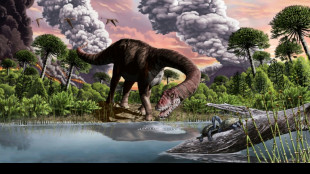 Faeces, vomit offer clues to how dinosaurs rose to rule Earth
Faeces, vomit offer clues to how dinosaurs rose to rule Earth
-
Ruby slippers from 'The Wizard of Oz' up for auction

-
 Spain factory explosion kills three, injures seven
Spain factory explosion kills three, injures seven
-
US Fed's favored inflation gauge ticks up in October

-
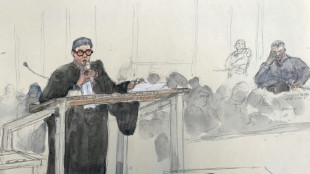 Defence lawyers plead to judges in French mass rape trial
Defence lawyers plead to judges in French mass rape trial
-
US says China releases three 'wrongfully detained' Americans

-
 New clashes in Mozambique as two reported killed
New clashes in Mozambique as two reported killed
-
Romania officials to meet over 'cyber risks' to elections

-
 Chelsea visit next stop in Heidenheim's 'unthinkable' rise
Chelsea visit next stop in Heidenheim's 'unthinkable' rise
-
Former England prop Marler announces retirement from rugby

-
 Kumara gives Sri Lanka edge on rain-hit day against South Africa
Kumara gives Sri Lanka edge on rain-hit day against South Africa
-
Namibia votes with ruling party facing toughest race yet

-
 Spurs goalkeeper Vicario out for 'months' with broken ankle
Spurs goalkeeper Vicario out for 'months' with broken ankle
-
Moscow expels German journalists, Berlin denies closing Russia TV bureau


Phallus and the boar: Turkey digs yield clues to human history
The dry expanses of southeastern Turkey, home to some of humanity's most ancient sites, have yielded fresh discoveries in the form of a stone phallus and a coloured boar.
For researchers, the carved statue of a man holding his phallus with two hands while seated atop a bench adorned with a leopard, is a new clue in the puzzle of our very beginnings.
The 2.3-meter (7.5-foot tall) work was discovered at the end of September at Karahantepe, in the heart of a complex of some 20 sites that were home to thousands of people during the Stone Age.
Karahantepe is part of the network around UNESCO-listed Gobekli Tepe, a place where our prehistoric ancestors gathered to worship more than 7,000 years before Stonehenge or the earliest Egyptian pyramids.
Necmi Karul, who heads the prehistory department at Istanbul University, found the toppled statue that was broken into three sections.
"We found several statues of this kind... but for the first time here we found the phallus," said the archaeologist, who coordinates the work of a project focused on the area's settlements.
The man lay in one of the first rectangular buildings, probably as a pillar supporting the wooden roof -- clues to how people used the site.
Karul said these settlements bear witness to "a new social order born after the Ice Age."
"The main reason to start a new kind of architecture is to build a new type of society," he noted.
- 150 more years of work -
Gobekli Tepe -- which some experts believe was never actually inhabited -- may be part of a vast sacred landscape that encompasses other nearby hilltop sites that archaeologists believe may be even older.
But the first modest photos of the statue released by Turkey's culture ministry led the local press to suspect censorship in the Muslim nation that has veered conservative under President Recep Tayyip Erdogan.
"We are archeologists, censorship doesn't exist! We had not yet found a phallus," the archaeologist said, laughing.
But there's meaning hidden in the discovery.
"Before leaving a site they (residents) used to crash the pillars and the statues -- but before, they broke the nose and the phallus," he said.
Then the site was filled in, buried under tonnes of sand and earth.
Its function remains unknown as do the reasons for the sudden abandonment and destruction of place after apparently hundreds of years of use.
The largest room at the site, surrounded by smaller rooms, seems to have been a kind of gathering place accessed via a narrow passageway, supported by a forest of phallus-shaped pillars topped by a man's head carved out of the rock.
"Those who entered here knew the symbols... they knew the meaning, it told them a story but we don't know it," he added, noting they have not found any female figures.
Perhaps they were made of wood, he noted, hazarding a guess.
No sooner had Karul unearthed the Karahantepe man, when he made another discovery the same week at Gobekli Tepe.
Archaeologists found a 1.2 metre long by 70 centimetre tall (4-foot by two-foot) depiction of a boar, with red eyes and teeth as well as a black-and-white body.
This 11,000-year-old wild pig is the first coloured sculpture from this period discovered to date, Karul said.
The site was occupied for some 1,500 years before being abandoned.
Of the 20 area sites in Tas Tepe (Stone Hills) project that is coordinated by Karul -- which stretches over 120 kilometres not far from the Syrian border -- only nine are being excavated.
"Work for the next 150 years", noted Karul, who has decided that both the man and the boar will remain where they emerged from the earth, but with the necessary measures to safeguard them.
O.Lorenz--BTB

